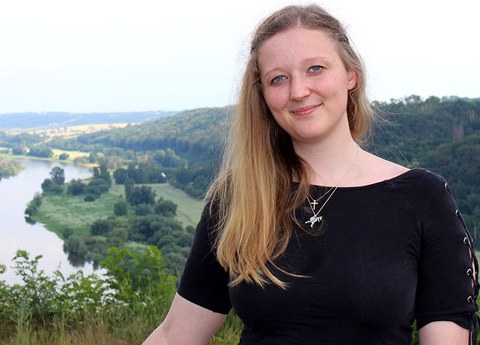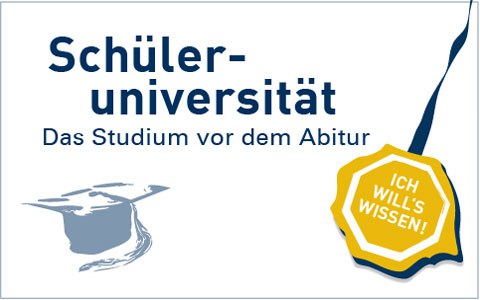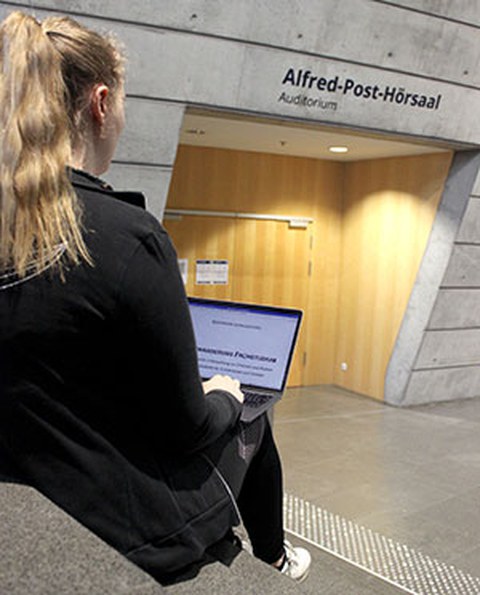"You can do more with the right motivation"
(Interview from 2021)
Dagmar Möbius
Stefanie Gentzsch attended TUD’s Pupils’ University starting at age 15. An injury she sustained was only one reason for her decision. But that is not the whole story. There are a number of things the 25-year-old would like to see change in Germany's schools. A graduate portrait of a different kind.

Stefanie Gentzsch was born in Munich and grew up in Dresden. She first studied psychology, then social pedagogy at the TUD Frühstudium, or Pupils’ University for school-age students. And she has written a detailed paper on the subject...
"Spontaneous ideas are usually the best ones," says Stefanie Gentzsch, thinking back. She was a gymnast but sustained an injury when she was in 8th grade, and with more time on her hands, she began reading psychology journals. In the school year that followed, she got a placement at the Psycho-social Counseling Center run by Studentenwerk Dresden. She first read about the TUD Pupils' University shortly before starting her placement, and told Dr. Sabine Stiehler, the head of the counseling center, all about her discovery. Dr. Stiehler recommended a dissertation about early studies to her. "I read it, and immediately thought, yes, I'm doing that," remembers Stefanie Gentzsch. Within half an hour, she had put together all the documents she needed for her application, including a personal statement. She then simply "steamrolled" her parents: "I need your signature." They agreed. Next was the required reference from her school. "They had to confirm that I was a suitable candidate for the program. In other words, whether I could afford to miss stuff and whether the school supported my application."

The TUD Pupils’ University allows high-achieving school-age students to take a closer look at their preferred course of study before they graduate from high school.
Stefanie Gentzsch applied in January 2012, was accepted in February, and began studying in April. She started with psychology, taking one or two classes each week – amounting to around four class sessions weekly. That increased later as she took more classes. From the outset, she realized, "university suits me, I can organize everything myself. Even my grades were better than in school." She met between 20 and 25 fellow early students each semester. Few schools know about the project or support learners, she heard.
Is she gifted? At the word, she rolls her eyes with a grin and says, "The idea of an 'IQ' bothers me. You can do more with the right motivation. It has to do with attitude. Being a little gifted helps you do more." She has never taken an official IQ test. "Just one as part of a subject I was studying. 135. That's not really representative." She would never have managed a bachelor's degree on the program like one fellow student did, she says. After one semester, the young woman interrupted her studies for a three-month language course at the English Communication School in Malta. Which she completed with a C1 certificate.
Both interest and a weakness for numbers are the reasons she gives for her choice of psychology. "Math was my thing. How do you set up an experiment? How can you interpret data?" But she did not want to follow the counseling route or psychotherapy professionally. Nor did committing entirely to research appeal to her. She found that "you have to do a lot of memorizing. It's not my cup of tea." That's why Stefanie Gentzsch switched to social pedagogy in the 4th semester of the program. "I'm not so such of a people person, and I was interested in how I could interact with others."
In 11th grade, Stefanie Gentzsch studied the early studies system for her BeLL. "I always had trouble finding the right school," she says. She transferred from a state high school to a private one. All previous research had always looked at the field from the outside, and never from a personal perspective. Stefanie Gentzsch conducted extensive empirical studies and interviews. Her final paper on walking the early studies tightrope – an empirical study of the opportunities and risks of early studies for high school students ("Gratwanderung Frühstudium: Eine empirische Untersuchung zu Chancen und Risiken des Frühstudiums für Schülerinnen und Schüler") – is 60 pages long with a 250-page appendix. Dr. Sabine Stiehler served as her advisor with support from Katarina Stein (the early studies project coordinator). It has not been published, but Stefanie Gentzsch is happy to provide the paper to anyone who is interested.
The school did not recognize her achievements from the preceding three years of early studies and she tells us, "I had to take my final high school exams in 2015 like everyone else." She did not want to go straight on to university. "I learned that it is important to get out of the system for a while." During a year's volunteering with Diakonisches Werk Sachsen, she was the go-to person for various tasks in a children's and group home, and looked after a student at a school for the intellectually disabled.
Stefanie Gentzsch had a pretty strong idea of what career direction she wanted to head in. "Something to do with math and numbers. But I didn't have the grades for economics and engineering. Education in general wasn't concrete enough for me." After talking to an advisor, Stefanie Gentzsch pursued a bachelor’s degree in business education at TU Dresden from 2016 to 2018. "I got off to a better start at university because I knew the drill," she says. In her 5th semester, she was able to switch to economics and engineering. While studying, she worked part-time at B+P Bau- und Projektmanagement Dresden GmbH, and freelance for one year in quality management on audit preparation and documentation. She continued her studies in 2018, starting a Diplom degree program at TU Dresden. Occasionally, she is asked about her early studies, and is happy to talk to anyone seeking advice. "Even teachers have asked me what they could do better," she smiles. She still has three semesters to go. In the future, she could see herself working in the energy industry, in the field of renewable energy. Her production engineering specialization opens up many possibilities, she says.
There are many things that Stefanie Gentzsch finds problematic when she looks back at her school days. Such as sitting in class from 8 am to 4 pm where you have no say over what happens. "I don't do well with simply doing the set hours," she says. She often did her homework while still at school. "It's a balancing act: It's called an 'allgemeinbildende Schule' [school for general education], but the social aspects are neglected." She herself took a school subject called "social responsibility" and is convinced that subjects like that "should be offered everywhere." Children should be taught where to find information, how to learn, even autogenic training, for example. "The grading system says nothing about what you are like as a person," believes Stefanie Gentzsch. "There should be an additional verbal assessment."
She had to stop competitive gymnastics, but she is still into sports. She goes inline skating, plays badminton, and dances – ballroom and Latin. As another, different outlet for her energy. You won't hear a word like “boredom” from Stefanie Gentzsch. Because "you can do more with the right motivation."
Contact:
Stefanie Gentzsch
Email

